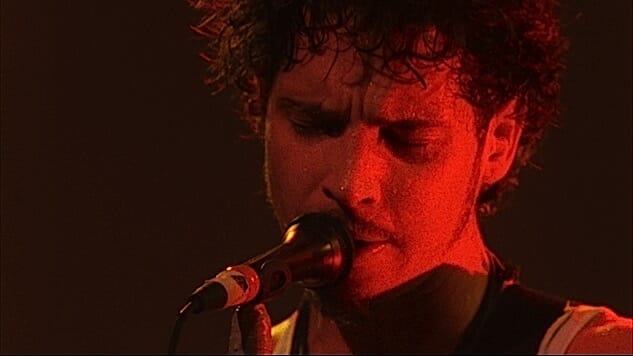Seattle and Grunge Two Decades Later: A Conversation with Filmmaker Doug Pray
On the eve of an anniversary reissue, the Hype! documentarian looks back.
Photo: Diana Rathe Pray
Back in August, Paste published a feature story that explored the death of Soundgarden/Audioslave frontman Chris Cornell through the lens of the tragedies that ultimately defined many of Seattle’s late-’80s/early-’90s “grunge” bands. One of the voices we consulted was that of filmmaker Doug Pray, whose 1996 Seattle music documentary Hype! explored the explosion of the scene that made cultural institutions out of the Sub Pop label and bands like Soundgarden, Nirvana, Pearl Jam, Alice in Chains, The Melvins, Mudhoney, Screaming Trees and Tad. Shot in 1993 and 1994, with the Seattle phenomenon still going strong even as it grappled with Kurt Cobain’s death, Hype! didn’t come out until two years later, cementing the film’s place as an unintended postmortem on one of the most storied music scenes in history.
Twenty-one years later, Hype! is being re-released, with several extra features, on Blu-Ray this Friday. While in the midst of editing the hit HBO music documentary series The Defiant Ones, which he executive produced, Pray shared his insights on Seattle, grunge and the price of fame. The interview has been condensed and edited.
Paste: Most of the iconic frontmen from those Seattle bands of the ’90s have passed away through some kind of self-inflicted means. Chris Cornell himself dismissed the notion that Seattle was different when it comes to indulgence and tragedy. But when you look at other scenes and clusters of bands, it’s tempting to ask: Why didn’t this happen as much in other places?
Doug Pray: Well, one thing about that is: people are less from places now because of the internet. I was at South By Southwest showing the movie and I caught myself thinking, ‘You know, I think this is the last portrait of any place in history where you could actually call something by the city’s name in terms of music.’ And I know that’s not really true, that there are cool things out of Manchester or Jamaica or wherever. I know that’s always going to happen, but there really are unique things about Seattle that created that scene. It was after that, as soon as it was all done, the internet took off. So a rock star today is less from a place. You might be interested in where they’re from, but it’s not like, “Oh, they’re a result of that way of thinking because that city has that way of thinking.” And so if somebody commits suicide or passes away, you’re not going to affiliate it with anything now. You’re just going to say, “How sad” or “Oh, that’s fame.” But with Seattle, there was a lot of death—there just was. There was a lot of drug abuse, more than usual. And more depression than usual.
Paste: When you say “more than usual,” what are you using as a comparison for that?
Pray: I guess just the way people talked about it, like the way [producer] Jack Endino talks in the film about the death of [Mother Love Bone frontman] Andrew Wood, like, “There goes another one.” You know what it is? There was an innocence about the Seattle music scene, because it really was a genuinely organic, authentic, amazing underground culture. And when it grew up, anything that happened to it, it was sort of like a family. I think it felt more like a family, so deaths in that family were felt more acutely. So Kurt Cobain taking his life—losing his life—really was a metaphor for the death of the Seattle music scene. And I really thought about it. When Kurt Cobain died, my first reaction was, “Oh god, I don’t want to finish this film now.” It was just so depressing. Because there’s a lot of humor and goodwill and fun in the movie. The movie wasn’t that dark! It was more just about pop culture, like “What happens when the world descends on a small community and labels it and sells the hell out of it?” And if the answer to that story is, “Well, people die,” it’s just depressing.

A young Eddie Vedder in Doug Pray’s Hype!
Paste: Given how quickly Seattle mushroomed into a cultural phenomenon, it was inevitable that people would feel shell-shocked—and resentful of how their scene was being presented to the rest of the world.
Pray: It really was just a year or two, as the film details, with “Smells Like Teen Spirit.” But there are other things: There are regional ways of being, ways of humor, a behavior, a way of addressing and reacting to things. There used to be, at least. Like, you go to New York and you’re like, “Oh my god, is that ever a New Yorker.” Well, what does that mean? That means there’s a behavior, a pattern, a way of addressing things and reacting to things. Seattle always had this unbelievable sense of self-deprecation, which is powerful. [Laughs.] Of course, it came from punk rock—“We’re losers; we’re the Ramones; I’m an idiot; I’m a fuck-up.” So there’s that huge strain, and that was everywhere in rock ’n’ roll and punk rock. But Seattle had a specific loser humor. And when all of a sudden someone‘s making millions and millions, it’s like, “Oh shit, now what do we have to say?”
Paste: Several of the musicians over the years have spoken about the impact of all that media glare and record-label attention as a kind of collective trauma. At first they might have been psyched about it, but then it grew out of their control.
-

-

-

-

-

-

-

-

-

-

-

-

-

-

-

-

-

-

-

-

-

-

-

-

-

-

-

-

-

-

-

-

-

-

-

-

-

-

-

-










































